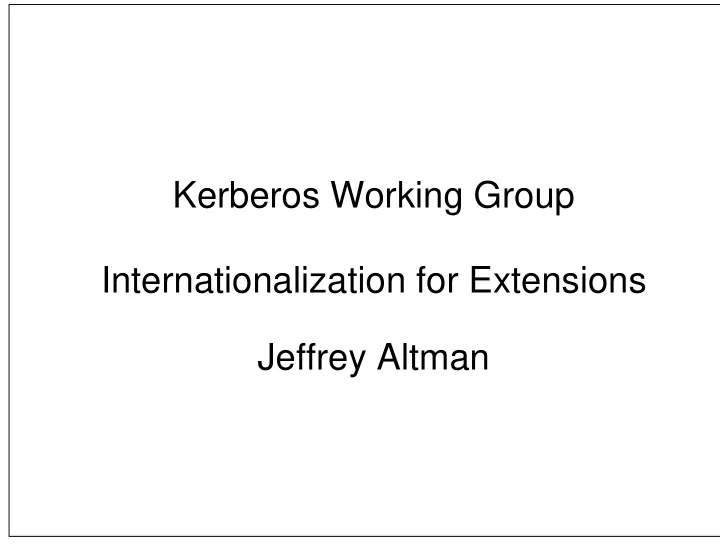

Kerberos Working Group Internationalization for Extensions Jeffrey Altman
PAGE 1 Guiding Principles Use Unicode restricted as needed to provide interoperability and future extensibility A single set of string preparation rules for all normalized strings Do not restrict Kerberos strings to the subset allowed by IDNA Must support IDN components and IDN-based realms
PAGE 2 ASN.1 RFC1510 / Clarifications: KerberosString ::= GeneralString (IA5String) Extensions: KerberosString ::= CHOICE { ia5 GeneralString (IA5String), utf8 UTF8String, ... }
PAGE 3 String Preparation SASLprep for all Kerberos strings IDN derived principals and realms to be Nameprep prepared Open Issue: Full Stop mapping Issues are same for SASL and Kerberos Suggest deferral to SASL
PAGE 4 Types of KerberosString usages storage normalized no unassigned code points query normalized unassigned code points allowed display unnormalized
PAGE 5 More ASN.1 Define types derived from KerberosString to convey the appropriate usage: KerberosQueryString KerberosDisplayString KerberosStorageString KerberosPasswordString KerberosSaltString KerberosPrincipalQueryString etc
PAGE 6 Migration Strategy RFC1510/Clarifications messages must use GeneralString; Extensions messages must use UTF-8. This is enforced by ASN.1 constraints. Interoperability between mixed environments is ensured when KerberosStrings are restricted to IA5String. Extensions must be used when i18n names are used throughout.
PAGE 7 Error Conditions Extensions KDC / RFC1510 Client: KDC sends KDC_ERR_ETYPE_NOSUPP if salt cannot be represented as IA5String RFC1510 Service / Extensions Client: If client principal cannot be represented as IA5String, a new error KDC_ERR_SERVICE_TOO_OLD is returned.
PAGE 7a Error Conditions Cross-realm in mixed environments: There may be a need to downgrade transited-realm field to RFC1510 string forms. If the contents cannot be represented as IA5String, a new error KRB5_ERR_TRANSITED_REALM_TRANSLATION is sent.
PAGE 8 RFC3490 (IDNA) vs Kerberos IDNA uses Nameprep for string preparation performs case folding to lowercase performs full stop mapping SASLprep(Nameprep(Unicode)) != SASLprep(Unicode) domain-style realms host/* principals with IDN components Solution: Apply Nameprep before SASLprep in contexts where we know
PAGE 8a Constructing Host-Based Service Principals Separate IDN component into labels at full stop (any form) For each label: If label begins with ACE prefix, remove prefix: convert to Unicode If label contains one or more 181n characters: apply Nameprep If label contains only IA5String: convert to lowercase Join labels by U+002E (full stop) Pass string to SASLprep
PAGE 9 Constructing Domain-Style Realms Realm name without ’:’ or ’/’ Separated by U+002E (full stop) Same as principal construction EXCEPT lowercasing all-ASCII labels is an open issue
PAGE 10 Implications for KDB - kadmin KDB should store unnormalized strings for use in UI display, error messages, and compatibility with just-send-8 RFC1510 Kadmin client must send unnormalized to server Client must first apply string preparation to ensure no unassigned code points are used Server must apply string preparation and reject strings which contain unassigned code points
PAGE 11 Things to Do Verify compatibility with just-send-8 Assign new error messages X.500 realm names Others?
Recommend
More recommend